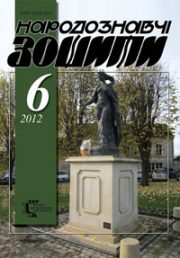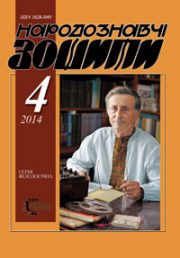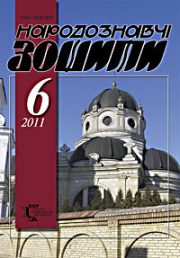The Ethnology Notebooks. 2023. № 4 (172), 1103—1110
UDK 398.332.4(=161.2)
DOI https://doi.org/10.15407/nz2023.04.1103
DIAKIV Volodymyr
- ORCID: https://orcid.org/0000-0002-9513-4364
- PhD of Philological Sciences, Senior Researcher Fellow at the Ethnology Institute of the National Academy of Sciences of Ukraine, 15, Svobody Avenue, 79000, Lviv, Ukraine;
- Lviv Polytechnic National University,
- department of the Ukrainian language
- Institute of Humanities and Social Sciences,
- 12, Bandera street, 79013, Lviv, Ukraine,
- Contacts: e-mail: d.v.m.1029@gmail.com
Abstract. Introduction. The relevance of this paper is conditioned by the need to explore the folk and religious beliefs and views of Ukrainians associated with the Feast of the Miracle of St. Michael in the context of the preconditions for the Christmas and New Year period in calendrical rites.
Problem Statement. The subject matter of the study is the folk calendrical rituals of Ukrainians associated with the Feast of the Miracle of St. Michael, particularly the traditional calendrical rituals. The scope of the study is the specific manifestations of folk Christian religiosity in these rituals.
Purpose. The purpose of the outlined work is to highlight the folk and religious views and beliefs inherent in the traditional early winter period, to determine the traditions framework and further transformations, and the peculiarities of the development of ideological, substantial, and structural components, elements, and details.
Materials and Methods. The source base of the paper comprises mainly archive materials and field data, as well as academic literature on this topic. The main methods were comparative typological and culture-historical ones, as well as elements of structural and typological, geographical, and other methods of Ethnology.
Results. Based on the archive materials and field references, the development of particular folk religiosity in the traditional calendrical rituals of Ukrainians is analyzed in the context of the preconditions for the pre-Christmas and New Year period.
Conclusion. From a historical and ethnological perspective, in Ukrainian science, there’s relatively little research on the Feast of the Miracle of St. Michael.
The preconditions for the pre-Christmas and New Year period in Ukrainians’ traditional calendrical rituals begin as early as during the autumn period, including on the Feast of the Miracle of St. Michael. Against the backdrop of the preconditions for the pre-Christmas and New Year period, a specific development of a particular folk religiosity is observed in Ukrainians’ traditional calendrical rituals as early as on this Feast of the Miracle of St. Michael. This is confirmed by the folk and religious views and beliefs representative of the traditional early winter period, in particular those associated with the observance of the rules of godly behavior, due respect for the Feast, and the appropriate celebration of the Feast of the Miracle of St. Michael, etc.
Keywords: the Feast of the Miracle of St. Michael, folk religiosity, calendar rituality, functioning, beliefs.
Received 4.07.2023
REFERENCES
- Dyakiv, V. (2019). Feast of saint Simeon: folk religiosity in traditional calendar ritualism of Ukrainians against the background of pre-New Year and pre-Christmas period. The Ethnology Notebooks, 2 (146), 293—302. DOI: 10.15407/nz2019.02.293 [in Ukrainian].
- Shukhevych, V. (1904). Hutsulshchyna. Fourth part. XVII: Church rituals. Materials for Ukrainian ethnology (Vol. VII, pp. 1—272) [in Ukrainian].
- Dykarev, М. (1905). Folk calendar of Valyki Uyezd (Borisovo Volost) in Voronezh region. Materials for Ukrainian ethnology (Vol. VI, pp. 114—204) [in Ukrainian].
- Stishova, N. (2011). Custom and ritual culture of Slobozhanshchyna in the calendar holidays of the autumn cycle of the Ukrainians (based on folklore ethnographic field research). Calendar Rituals in the Life of an Ethnic Group. Collection of scientific papers (Pp. 305—313) [in Ukrainian].
- Onyschuk, A. (1912). Folk calendar. Customs and beliefs are tied to single days of the year, recorded in 1907—10 in Zelenytsia, Nadvirnyansky district. Antin Onyshchuk, people. teacher. Materials for Ukrainian ethnology (Vol. XV, pp. 1—61) [in Ukrainian].
- Shekeryk-Donykiv, P. (2009). The year in Hutsul beliefs. Selected works. Verkhovyna [in Ukrainian].







